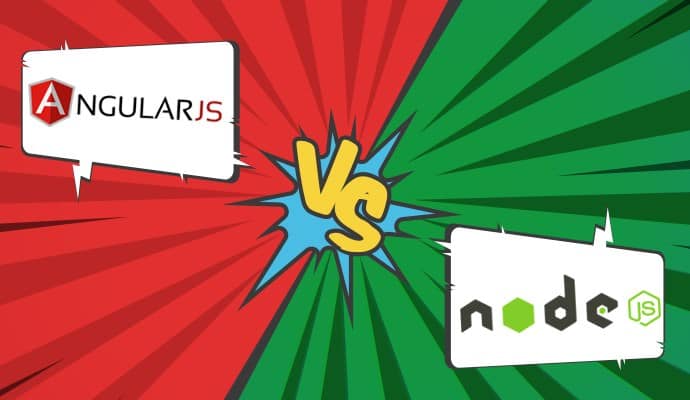AngularJS V/s NodeJS: Round 1

TechsPlace | The JavaScript war is at an all-time high. Developers all across the globe are debating on the best tool to use for JavaScript applications. Over the past few years, JavaScript as technology has evolved way beyond a simple client-side scripting language into an incredibly powerful programming language that can also be used to build numerous server-side applications. As a result, the AngularJS framework and NodeJS platform both can be used for making powerful client-side and server-side applications that are pretty feature-rich and interactive in nature. In fact, both frameworks use techniques like AJAX, DHTML, DOM, scripting and much more. However, this does not mean that these can be used interchangeably. Apart from this, these frameworks are pretty much different from each other. Let’s dive in for deeper insights.
So, what sets apart these tools and how useful are they for Js software development?
According to the current Google trends, AngularJS has performed way better at the start of 2016 but observing the graphs these two frameworks are competing very closely.
AngularJs vs Node.js
Being a JavaScript framework, Angular JS is an open source web application framework mainly maintained by Google. The framework can be easily added to an HTML page with a <script> tag. It extends HTML attributes with Directives and binds data to HTML with Expressions. This helps the user in adding dynamic views in their web application and is integrated with Model-View-Whatever (MVW) architecture and components, with the help of which, it has gained the position of the most preferred framework for the creation of data-driven apps and interactive web applications.
Some of its key features include:
MVC Framework- With a smooth Model View control Architecture, the framework becomes pretty dynamic in nature. Now an app is built by combining different modules together, the modules work with different logics. Though, being different from each other, these modules are connected with some logic. As a result, developers require to build all the components on a separate basis and combine them with some code and applied to fix them in a single application. This, of course, is an overhead for the developers while using an MVC Framework.
MVC makes it easier for AngularJS developers to build the client-side web application. All the MVC elements which are developed separately are combined automatically using AngularJS Framework. There is no need for developers to write extra code to fit all the elements together. It allows you to put the MVC element separately and automatically sets them together accordingly.
Easy to use- Decouples DOM manipulation from any application logic, and this is what makes easy to use in terms of the framework. Comes with many useful features like directives, filters, and automatic data bindings, by which developers do not need to write complex codes for simple features. So, the codes become more optimized.
AngularJS Architecture- Blessed with an MVW (Model-View-Whatever) architecture and is capable of supporting other patterns too like Model-View-Controller or Model-View-View Mode. The view modifies and manipulates the DOM to update the data and the behavior. But with the use of AngularJS development, the DOM manipulation is the task of the directives and not the view.
NodeJS
Being an open-source, cross-platform runtime environment for developing server-side and networking applications, NodeJS applications are written in JavaScript and can be smoothly run within the NodeJS runtime. It also provides a rich library of various JavaScript modules which simplifies the development of web apps with NodeJS to a great extent.
Its key features include:
- Scalable: scale your Node.js application by using two ways – Horizontal Scaling and Vertical Scaling, which helps you to improve your application performance.
- Unit testing: It supports unit testing out of the box. You can use any JS unit testing frameworks like Jasmin to test your Node.js code.
- Server development: NodeJS has some built-in API which helps you to create different types of Server like HTTP Server, DNS Server, TCP Server, etc.
- Better performance: Of course, NodeJS provides better performance since Node.js I/O operations are non-blocking. Also, it uses a V8 JavaScript engine to execute JavaScript code. V8 engine compiles the JS code directly into machine code which makes it fast.
Conclusion
NodeJS is mainly used to build server-side applications, whereas AngularJS is suited for building single-page client-side web applications. It may quite interest you to know that both when combined create isomorphic web applications, i.e. applications that are built with the same language on the back and front-ends, but they are quite different in their architecture and working.
Rakesh Patel is Marketing Manager at eTatvaSoft – web, eCommerce and mobile app development company in India. He writes about Technology Trends, Leadership and many more things about IT services and enabled people to learn about new technologies through his online contribution.





